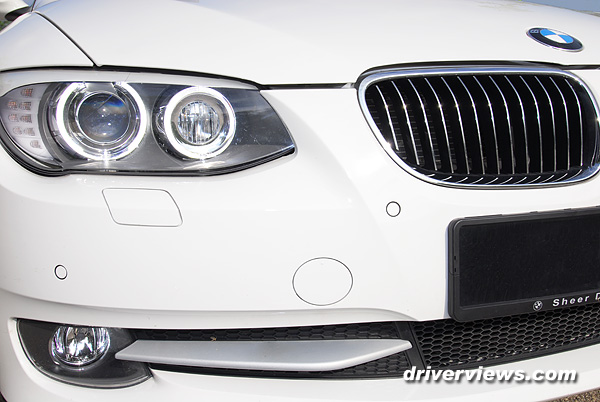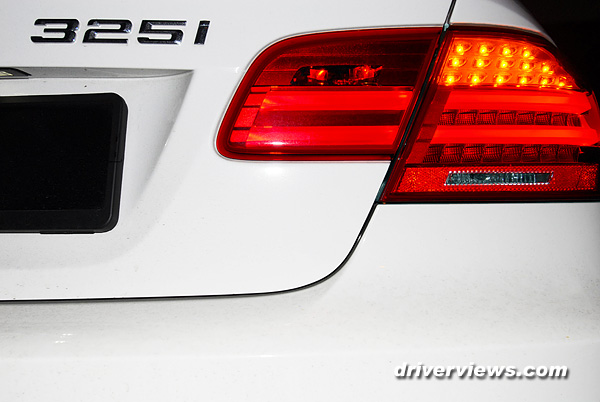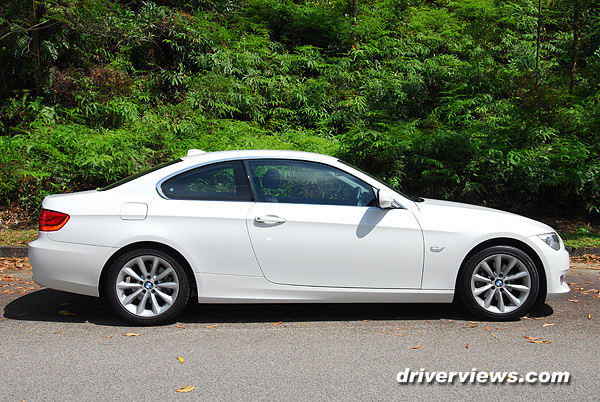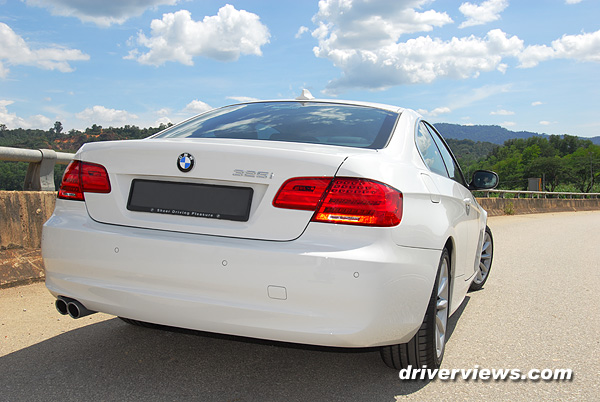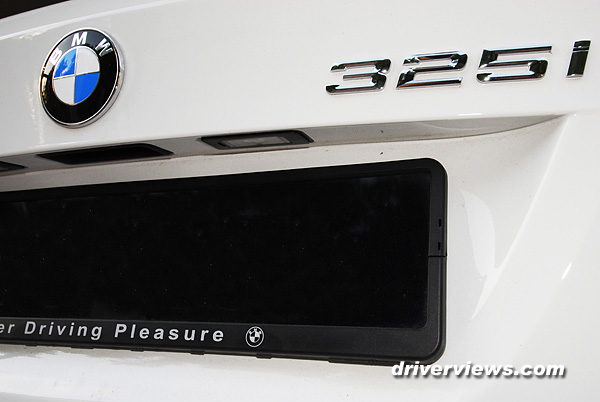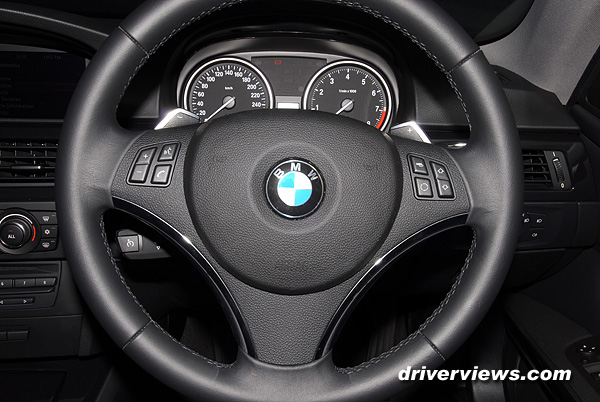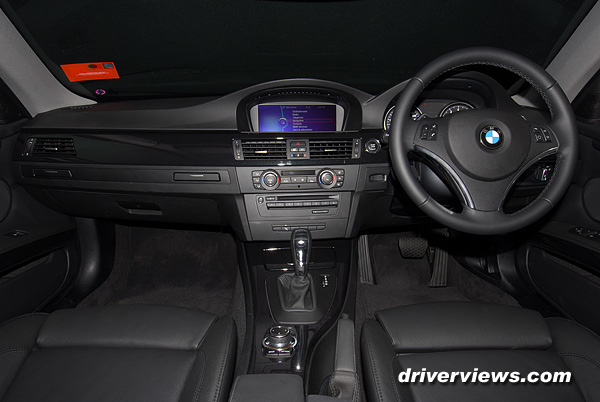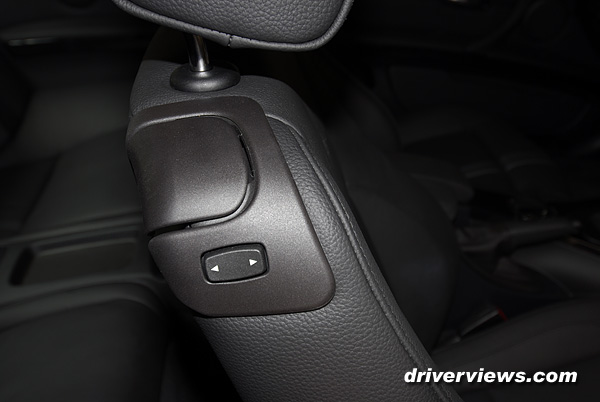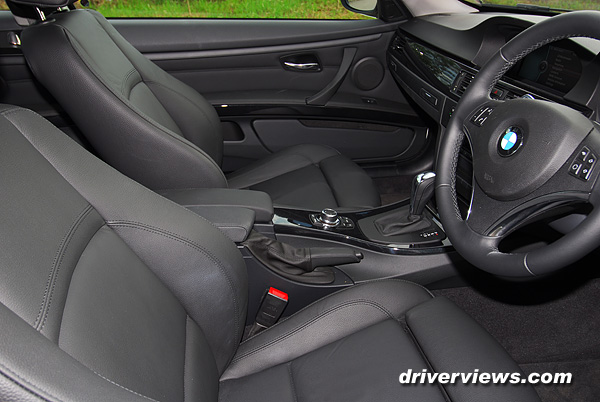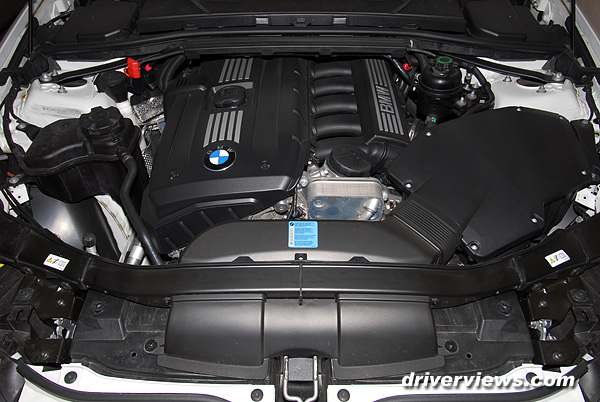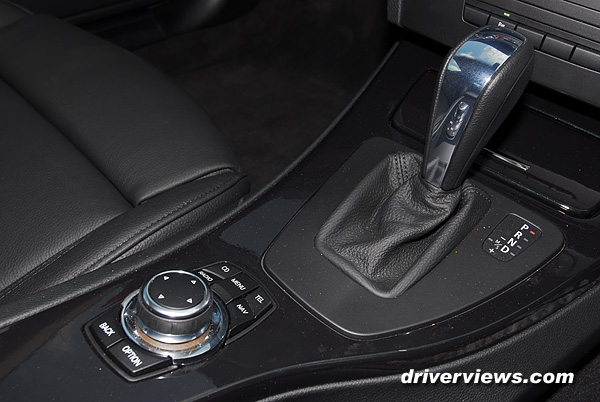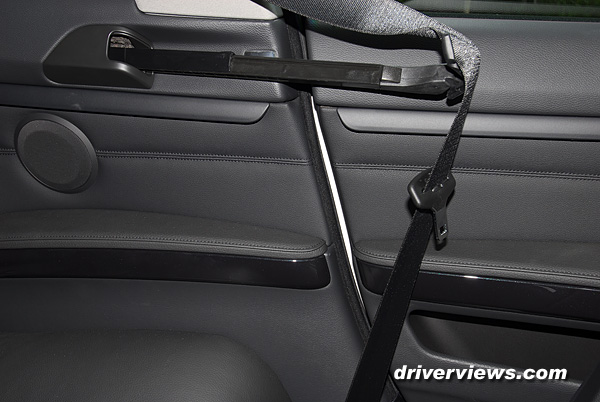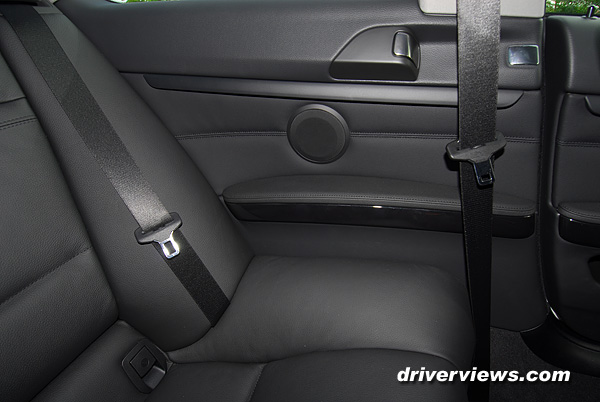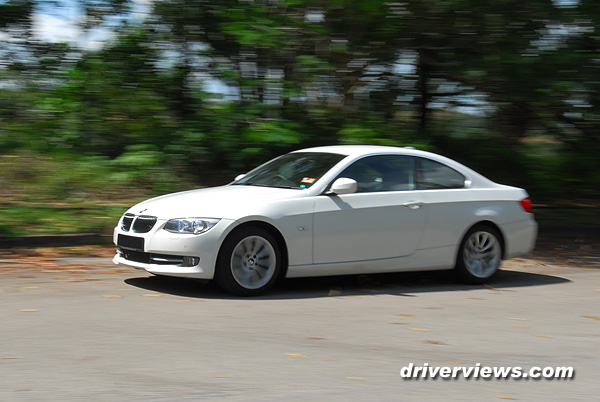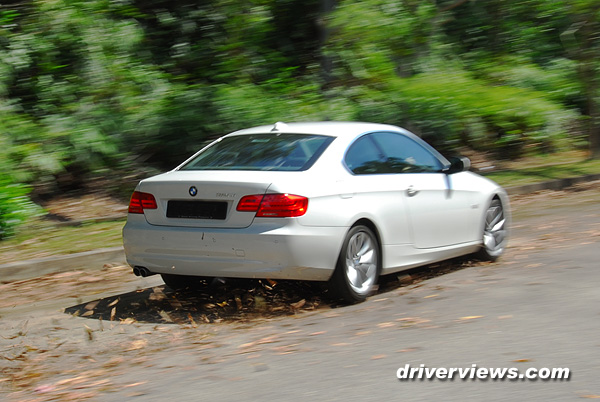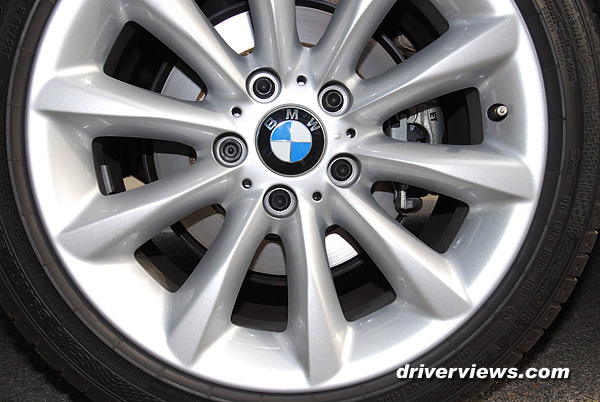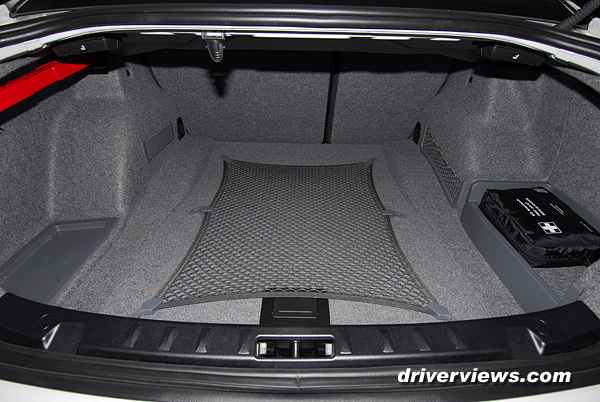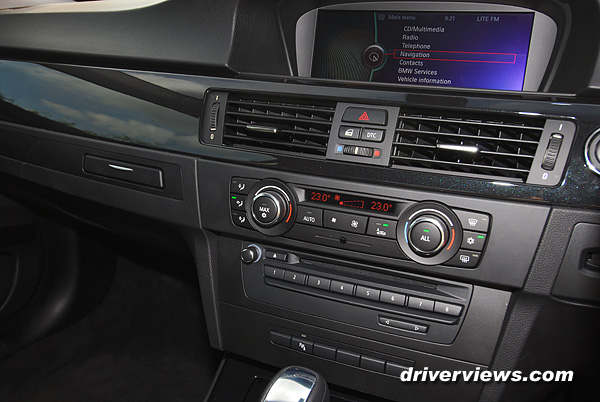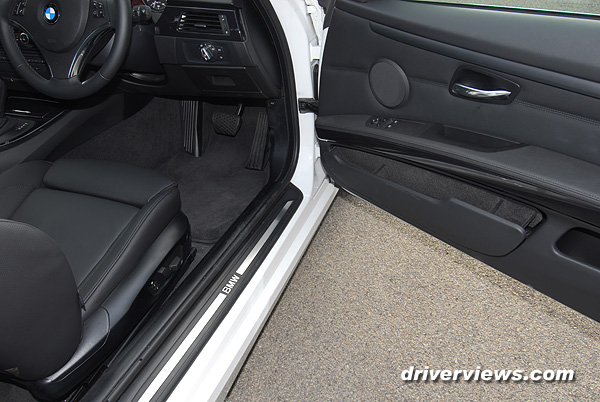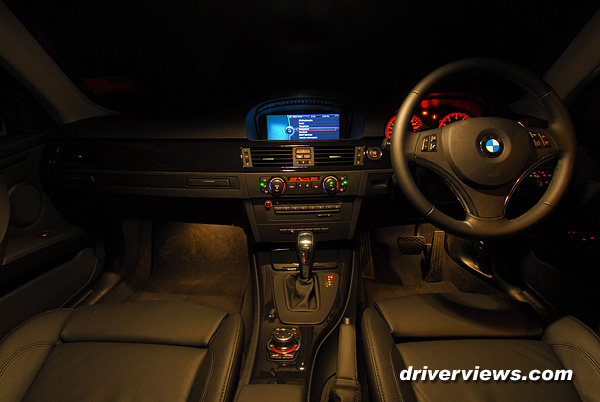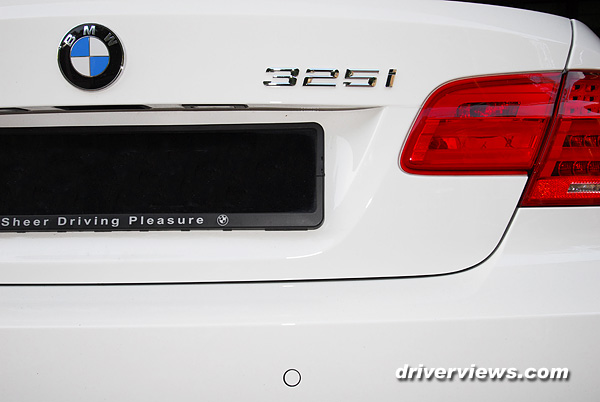It is slightly over a year since I tested the BMW E92 Coupé. That model then was the 320i which is a car designed with sporty intentions and an almost mirror like image of M3 Coupé. The 3 Series Coupé underwent another facelift not long ago with minor modifications. These design changes are very discreet and only upon closer scrutiny would you be able to spot the difference.
I had to pull out my old photo of the 320i Coupé taken last year and put it side by side to note the difference. At the front, the side air intakes are redesigned and the headlights now sport daytime running white LED corona lights. The rear lights are also redesigned, now redder as the previous reverse light banks are narrowed to a small rectangle. The rear signal indicators are orange LEDs.
In terms of dimensions, the latest 3 Series Coupé is slightly longer overall at 4,612mm compared to the older model which is at 4,580mm. However, the wheelbase remains unchanged at 2,760mm. In terms of width there is no difference for the rear seats but just a bit wider for the driver and front passenger. Strangely, the height from the seats to the roof has been lowered by 4mm in the latest model.
In terms of features there is more compared to the entry level 320i Coupé. Apart from the comprehensive list of safety features, the car is also equipped with an 8.8 inch LCD display at the centre console interfacing with the navigation system professional, park distance control and the iDrive system.
The car comes with Comfort Access which is basically a feature that allows keyless entry just by holding on the door handle, and keyless ignition by pushing the start/stop button while keeping your car keys in the pocket.
DRIVING IT
The first thing that you will notice once you are seated as a driver is that the gearshift paddles are now different. It does not work the same way like before. The previous gearshift paddles on either side work in the same manner (ie push for downshifts and flick inwards for upshifts). The latest gearshift paddles now have a “+” (upshifts) and “-” (downshifts) indicators and are activated with an inward flick. These paddles cannot be pushed and I suspect it will damage if you push it by force.
The redesigned gearshift paddles somewhat removes the ambiguity for a first time user. However, I prefer gearshift paddles that do not turn in synch with the steering wheel as it makes it difficult and tricky to change gears when you are making long turns.
That aside, the interior workmanship is first rate and if I am not mistaken the quality of the leather seats feels better than the previous 3 Series Coupé. An extra feature which is not available in the 320i Coupé is that the front seats have an electronic switch near the headrests to move the front seats forwards/backwards.
This is useful for the rear passenger as you do not need to reach downwards to the side of the front seat to access the seat adjustment switches. From the driver’s position, dials and controls are easily accessible but after being spoiled by the futuristic instrument panel on the 7 series, I was wishing for the same here for this model!
The 3 Series Coupé is made strictly as a 2+2, and is not the most practical vehicle for 4 adults. The rear seats though comfortable have limited legroom and would only be suitable for children or smaller sized adults. Getting in and out of the rear seats requires some effort due to the limited entry space.
As the driver I found headroom limited and I had to push the seats downwards at the expense of front views of the bonnet area. However, there is plenty of legroom for the driver and front seat passenger and you will not feel cramped. If the trip involves only the two of you, then this space allocation is just about perfect.
The 325i Coupé is powered by the N52 engine block. Possibly the next facelift we will be seeing the new N53 engine for this model. However, the N52 is still a class act being a 6 cylinder in-line petrol engine which is very refined. Max power is 160kW (218hp) @ 6,500rpm and max torque is at 250Nm @ 2,750 – 4,000rpm. Acceleration from 0-100km/h is achievable in 7.1 seconds. CO² emissions is 174g per km. Top speed is electronically limited at 250km/h.
Transmission is the 6 speed automatic with steptronic which is adequate but is quickly becoming dated in light of the recent introduction of the 8 speed automatic in other models in the BMW stable. Gearshifts are refined and orderly. Perhaps for the next facelift BMW should consider having at least the 7 speed with dual clutch system to raise the excitement levels.
Push the car harder and the engine note rises but not to uncomfortable levels. The car is more responsive compared to the 320i Coupé (which is powered by a 4 cylinder in-line petrol engine). But the difference is not significant if one usually drives in town speeds.
The better acceleration of the 325i Coupé would be more useful in highway runs or trunk roads here in Malaysia where the extra horsepower and torque enables quicker overtaking maneuvers. The 325i Coupé car balance is excellent as the chassis gives an assuring feeling of stability and control.
Ride quality is on the hard side and is close to the previous uncomfortable experience with the 325i Sports (Sedan). You can easily feel every inch of the road undulations and if road quality is poor, be prepared for a rough ride. Nevertheless, it is still better than the 325i Sports, but will cause discomfort to those who are used to softer suspension set-ups.
The car handling is good with a very accurate steering. However, for this particular model I was a bit surprised at the relatively heavy steering feel. This was unlike the pervious experience I had with the 325i Convertible which if I can recall correctly had a lighter and easier to turn steering wheel. The weight and feel of the steering is also a touch heavier than in the 320i Coupé.
Four days of town runs plus trunk roads yielded an average fuel consumption of about 12.1 litres per 100 km which is on the high side. The specs stated an average fuel consumption of 7.4 litres per 100 km (combined). By contrast the 320i Coupé is more frugal with an average fuel consumption of about 8.9 litres per 100 km covering relatively the same daily route. However, this is an improvement compared to the 325i Convertible which logged 12.5 litres per 100 km.
Fitted tyres are 17 inch Continental SportContact 2 SSR run flats with slimmer profile tyres at the rear ie 255/40 R17 compared to the front set at 255/45 R17. The tyres provided good grip and road holding. Tyre noise is at acceptable levels and should not be of a concern since the car is well insulated.
There is adequate amount of trunk space at 440 litres. The rear seats can be folded downward in a separate 60/40 configuration for additional space if so required. For entertainment, the car’s sound system performed adequately and is within expectations. Radio reception is top notch but music from CDs is dependent on the pressing. Less dynamic CDs would require a fair bit of tonal enhancements.
At the end of the day, I can’t help but compare the two 3 Series Coupé models which I have sampled so far. By coincidence I got the opportunity to drive the 320i Coupé just a week earlier. Although it is not as well specified as the 325i Coupé, I was impressed by the fuel efficiency, responsive engine and better ride comfort.
The 320i Coupé though powered by a smaller 4 cylinder in-line petrol engine, is no slouch and was able to generate more than sufficient power and torque that should meet the daily demands of driving in Malaysia.
Nevertheless, the 325i Coupé is a better specified model and offers better engine refinement, more power and torque, but at a cost of a stiffer ride, firmer steering and higher fuel consumption. If you are looking for a car with sporty pretensions, then the 325i Coupé should fit the bill nicely.
UPDATE 13/11/2010
We just returned from a trip. This journey involved mostly Highway runs covering a distance of around 700km+. This allowed us to assess the car’s performance in broader detail. The car’s insulation, although better than most cars, needs to be improved. External sounds and tyre roar (especially if road surfaces are not smooth) is more pronounced for runs >100km/h. Music from CDs at times struggled to be heard and a fair bit of tone enhancements are required. The car’s stability and balance is good and the engine performed within expectations.
The car’s best average fuel consumption was 11.7 litres per 100 km. The car fuel consumption seemed to accelerate towards the end of the tank. Hence, the on board computer data which shows distance available based on remaining fuel should not be taken at face value. The heavier steering feel shows its mettle in highway runs as it allows better control and reduces the risks of accidental movements that may upset the car’s balance.
VITAL STATISTICS
| Engine: | 6-cylinder in-line petrol engine | ||||
| Capacity: | 2,497cc | ||||
| Max Output: | 160kW (218hp) / 6,500rpm | ||||
| Max Torque: | 250Nm / 2,750-4,000rpm | ||||
| Top Speed: | 250km/h | ||||
| Acceleration 0-100km: | 7.1sec | ||||
| Fuel Consumption: | 7.4ltr/100km | ||||
Source: BMW Brochure
Note: Please reconfirm the above specifications with an authorized BMW dealer
SOUNDS
Click on these to sample sounds from the car!

